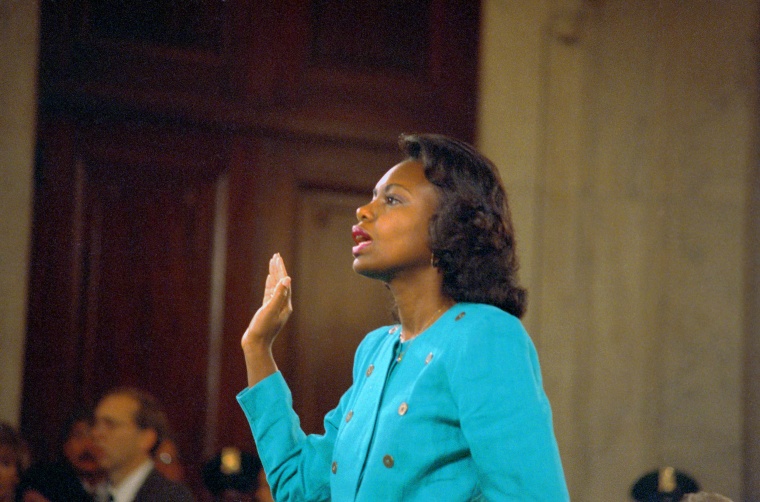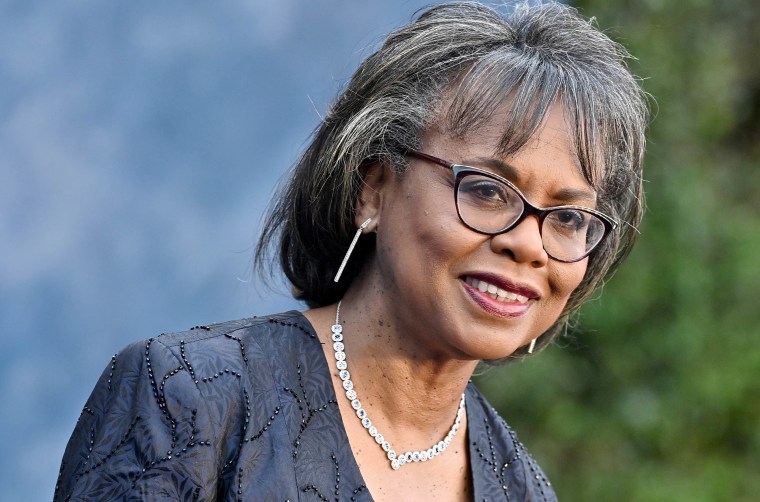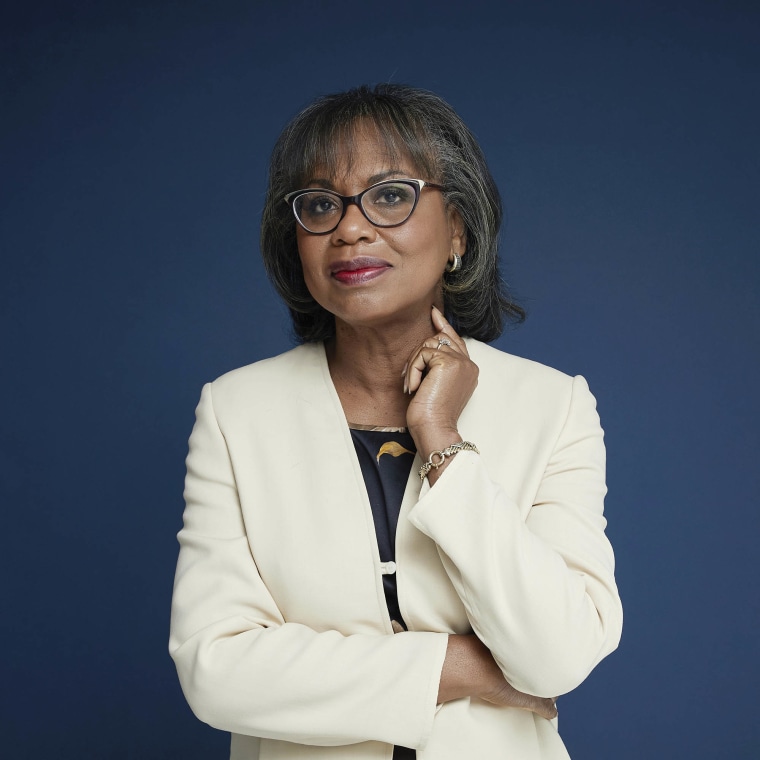It's been nearly 33 years since Anita Hill testified before the Senate Judiciary Committee in a series of hearings that both captivated and polarized the nation.
In October of 1991, the little-known Oklahoma law professor was called to testify over allegations that her former supervisor, Supreme Court nominee, Clarence Thomas, had sexually harassed her while she worked with him at the Department of Education.
During the hearings, Hill testified that while working as an assistant for Thomas, their relationship took a personal turn when he asked her to “go out socially” with him.
After refusing his advances over fears of jeopardizing what she thought at the time was a "very good working relationship," Hill testified that Thomas began an ongoing campaign in which he pressured her with sexual overtures and conversations that made her "extremely uncomfortable."
According to Hill's statement, her refusal to take their relationship beyond a professional level led to tension with her then-superior, who she said expressed "displeasure" in his tone, voice and demeanor, and commented on her personal appearance at work along with other boundary-crossing behaviors.
In his own testimony before the Senate Judiciary Committee, Thomas categorically denied all the allegations, saying that while he was by no means "a perfect person," he couldn't have done what Hill alleged and didn't know what he did to "cause her to make these allegations."
Though sexual harassment had been officially outlawed in Title VII of the Civil Rights Act of 1964, defining and subsequently enforcing it was a separate issue. Hill's landmark testimony, however, brought sexual harassment into the national conversation, which would result in a new set of standards over what is — and isn't — acceptable in the workplace.
Standards that Hill tells TODAY.com weren't even on the collective radar 33 years ago.
"Very quickly after I testified, I realized that there were people, women, men, nonbinary folks, all kinds of folks in the world who didn't even know that sexual harassment was against the law," Hill says during a recent phone interview.
"They just assumed it was something you had to put up with, and it was inevitable, and there was absolutely nothing that you could do about it," she explains.
Now, over three decades later, Thomas remains seated on the U.S. Supreme Court, and Hill is a professor of gender, race and law at Brandeis University. During her conversation with TODAY.com, Hill took time to reflect on what's changed since her landmark 1991 testimony and what work surrounding sexual harassment in the workplace remains yet unfinished.
We've come 'light years' since 1991

Hill says that the current perspective around sexual harassment has shifted dramatically since the 1990s.
"I think we've come to a place where a huge portion of the population understands that it is wrong," she says. "And that's progress in and of itself."
That progress is due, in part, to the willingness of people who have come forward about sexual harassment they've experienced, she says.
“How we got there from 1991 comes about because we started to open up and share our stories. We didn’t have the social media platform to help us do that, but people started sharing their stories with their coworkers, with their friends, with their family members, over and over again,” Hill explains.
"If you think about just the acknowledgement and awareness of the term 'sexual harassment,' for this society and throughout the globe, I would say very few people are in workplaces who don't have some sense of what the terms is, what it means, something to call it," she says. "And having a vocabulary around it is the start of awareness."
However, despite the gains, she says there's still a long way to go.
"What hasn't changed are the systems that are in place to respond, and that's where we are having problems," she says.
By "systems," Hill is referring to employers and corporations, who may have the correct protocols in place to address complaints of sexual and other types workplace harassment, but don't necessarily take action when it's reported.
As the chair of the Hollywood Commission, an organization founded in 2017 after the #MeToo movement began that addresses discrimination and abuse in the entertainment industry, Hill says that a recent survey by the Commission revealed that while workers may be well-informed about issues with sexual harassment and discrimination, many of them — even those who don't have these experiences in the workplace — are "more anxious now than ever to have it addressed in their workplaces."
Hill says that while employees are more outspoken than ever about wanting to solve the problem, "the processes for doing so don't allow for much accountability on the part of corporate corporations and the people who are engaging in abusive behavior," she says. Also, many workers don't have the financial means necessary to pursue legal action in cases of harassment or discrimination. Even if they did, Hill says any damages they'd potentially receive aren't likely worth the cost.
"They can't afford to complain. Some people cannot risk losing a job. They don't make enough money to be able to tide them over if that, in fact, happens because they complained about harassment," she explains.
In essence? There may be policies in place to protect workers, but if employers aren't accountable for following through when complaints are filed, then employees never actually reap benefits from speaking out — and fear the potential repercussions that can happen as a result.
'Sexual harassment and discrimination is not acceptable'
Going forward, Hill says she hopes to see true accountability on every level and an increasing awareness among workers and employers that when there's unchecked harassment going on in the workplace, "everybody loses."
And by "everybody," Hill means "not only the individuals who behave badly, but the managers who are a part an operation, and the leadership, because it's going to be speaking for the entire company to put everybody in their workforce on notice that harassment, sexual harassment and discrimination is not acceptable."
Beyond that, Hill says true change lies in the hands of the courts, including the Supreme Court.
Hill cites Vance v. Ball State University, a 2013 court case in which an employee alleged racial and sexual harassment, as an example. She says despite a dissent from Justice Ruth Bader Ginsburg, the Supreme Court ruled in favor of the employer, rather than the employee, based on what she says, in lay terms, would be a technicality. It set a precedent that she says is unlikely to change anytime soon.
"I don't know how we're going to get to a court that has the same understanding and thinking about what the law should be as Justice Ginsburg did, and as so many others have before, and will probably have since then," she says. "The concept of what the Civil Rights Protection should be doing."
Which, at its core, is in place to protect workers.
According to Hill, her "pie in the sky" would be to see a reversal in court decisions like Vance to ensure that employees of all organizations can go to a workplace free of harassment and discrimination.
Beyond that? "The cooperation of their employers to make sure that that is their lived experience," Hill says.
You don't get to 'decide your own legacy'

In a time of increasing political divide, Hill says that while she believes many people are currently being impacted by a movement that inhibits civil rights' protection, she also has faith that the country, overall, still stands behind progress.
"I believe that we're in a country who doesn't want to see our protections lost, all the progress that we have made, lost," she says.
"That's the one thing that allows me to get up and do this every day. If I didn't have that, I couldn't be out there promoting the ideas of equality, if I didn't believe that progress is a possibility."
In part, that unwavering faith comes from her parents, she says. The youngest of 13 children, Hill says her parents, born in 1911 and 1912, experienced a lot of "positive change" in their lives.
"To raise children during Jim Crow, blatant misogyny, unchecked misogyny and live through the Civil Rights era and then in the '70s, '80s and even into the '90s when were starting to progress, that's how I measure the possibility for change, as it was measured in their lifetime," she says.
"I'm a believer that the arc of the moral universe bends toward justice."
As far as having her name in the history books for having been a catalyst for helping create a safer, better workplace, Hill says she doesn't think she'll ever get used to the idea.
"Maybe I shouldn't ever get used to it," she says. "Maybe I should just try to keep being myself and doing what I do.
"You don't get to necessarily decide your own legacy, but you just hope that the world will understand that you're trying to make change for positive, for good reason."

